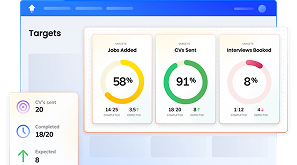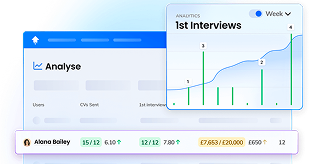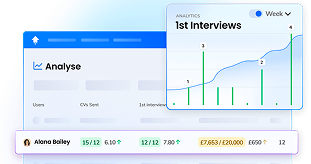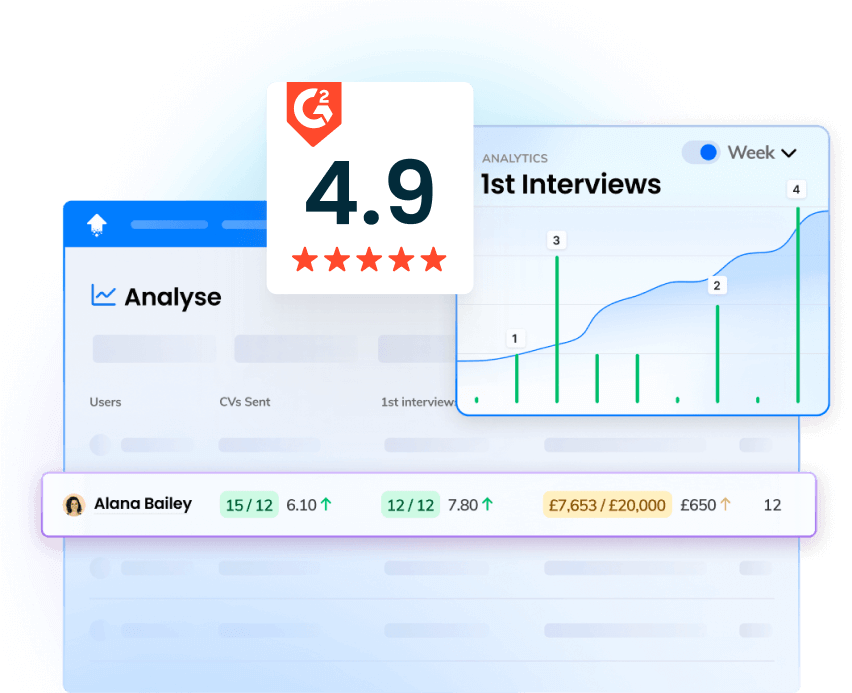The recruitment industry is more competitive than ever. Recruitment agencies face increasing pressure to win new clients while keeping existing clients engaged. Without a strong business development process, agencies risk falling behind.
Business development for recruitment firms is no longer just an option — it’s essential. To grow, agencies must use effective business development strategies that connect with their target audience and generate real business opportunities. They need to focus on client acquisition, build long-term relationships, and position themselves as trusted industry experts.
But attracting potential clients isn’t enough. A successful business development strategy must also strengthen client relationships, increase brand image, and create long-term value. Agencies that invest in market research, content marketing, and relationship building will stand out in a crowded space.
In this guide, we’ll explore 15 business development strategies tailored for recruitment firms. Whether you’re refining your sales processes, improving your public relations, or expanding into new markets, these strategies will help you stay ahead.
Understanding Business Development for Recruitment Agencies
Business development is essential for growth in recruitment agencies. So, what exactly is it?
It’s the process of securing business opportunities by combining sales processes, marketing efforts, and strategic planning. A solid business development strategy includes everything from market research and public relations to email marketing and paid advertising. It also involves relationship building, branding, press releases, and engaging with industry professionals at industry events.
A successful business development plan should not be static. Agencies must consistently refine their approach by tracking business goals, leveraging business development professionals, and analysing sales team performance. By focusing on client acquisition, generating leads, and connecting with targeted leads, recruitment firms can secure new business and maintain a strong brand image.
Building a Robust Business Development Process in 2025
Creating a business development process can seem daunting, but if you want your agency to be competitive, it's crucial to get started as soon as possible.
Here are ten simple steps for building a robust business development process.
- Define your recruitment niche
- Perform thorough market research
- Create an ideal customer profile
- Set your SMART goals
- Invest in tech tools to track key metrics
- Choose your business development tactics
- Create the necessary sales enablement materials
- Record the plan
- Measure the effectiveness of your tactics
- Continuously improve your business development plan in line with your data insights
15 Business Development Strategies and Tactics for Recruitment Agencies
So, how to do business development for your recruitment firm?
Read on for 15 strategies and tactics recruitment agencies should use within their business development plan.
#1 Showcase Success Stories and Client Testimonials
Nothing builds trust in a recruitment agency like authentic success stories and client testimonials.
Build multimedia case studies and testimonials with text, photos, videos, and prominent figures that showcase tangible results.
Focus on highlighting your agency's successes and the effectiveness of your recruitment strategies.
Display these on your website, showcase them on your social media channels, and build them into packages you can send prospective clients.
#2 Incentivise and Streamline Referral Programmes
Develop a referral programme with clear incentives for current employees and external networks.
Harness employee referral platforms and apps to ensure a seamless user experience that makes it quick and easy to engage with the programme.
Finally, it's vital to ensure the terms of the incentives are clearly outlined and rewards are delivered promptly.
#3 Leverage Public Relations to Build Brand Authority
Tap into the power of PR to establish your agency as an expert in the recruitment field.
When there's good news to celebrate—from awards and agency growth to big projects with outstanding results—publish press releases with strong hooks on your website and send them to relevant publications.
Build a section on your website to host thought leadership articles written by agency experts, and regularly post these on social media.
Participate in industry events such as conferences and workshops to raise brand awareness and enhance your reputation.
#4 Maximise Social Media Engagement
Regularly post insightful content on platforms such as LinkedIn and Clubhouse.
This content should be:
- Genuinely helpful or entertaining
- Tailored to the challenges and interests of your target audience
- Multimedia, with dynamic photos and videos sitting alongside text
Through likes, comments, and direct messages, you should also use your social media platforms to actively network and build professional relationships.
#5 Implement Email Marketing and Automation
After using social media and events to raise brand awareness, you need to push prospects and leads further down the funnel by encouraging them to opt into emails from your agency.
This way, you can employ email marketing to boost their interest and trust in your brand — so when recruitment needs arise, you're the first agency they think of.
Develop targeted email campaigns that nurture leads through personalised content.
This content should take them on a journey from initial contact to post-placement follow-up.
In 2024, email marketing no longer needs to be a huge time sink. Utilise email automation to maintain engagement without manual effort.
#6 Explore Content Marketing through Podcasting
Podcasting has exploded in the corporate world over the past few years — and joining this movement is an effective way to build brand awareness and position yourself as a thought leader in your sector.
Launch a podcast that discusses industry trends, recruitment strategies, and success stories. It's also important to interview prolific thought leaders and influencers within your industry — and ask them to share their episodes on their channels.
This strategy should enhance your agency's visibility, build your profile, and connect you with a broader audience.
#7 Invest in SEO and Content Marketing
When someone is seeking a recruitment business in their sector, they are likely to turn to Google.
And you need your recruitment agency to be one of the first organic results they see.
SEO and content marketing is how you can make this happen.
Invest in SEO and content marketing specialists who can boost your Google rankings by creating content that aligns with the search engine's ever-evolving algorithm.
It's crucial that this content is genuinely valuable to the reader and addresses specific pain points or challenges within your niche.
#8 Develop Comprehensive Sales Collateral
When it comes to business development for recruitment firms, every agency needs a regularly updated bank of high-quality content that salespeople can pull from whenever the need arises.
Produce sales materials like whitepapers, eBooks, and guides that address specific recruitment challenges while showcasing your agency's expertise within particular sectors.
#9 Build Brand Consistency
As outlined above, your business development efforts should involve producing a significant amount of content.
However, it's essential to ensure that all these materials — and, indeed, all client communications — align with your brand identity.
A lack of cohesion in marketing and communication can significantly damage trust in your brand, so striving for consistency is key.
Consider developing a branding and tone of voice document that all content products and external-facing staff are trained on and have access to.
#10 Emphasise Quality Over Quantity in Client Relationships
Don't waste your time pursuing a high volume of prospects with low engagement.
This eats up precious time that could be spent building deeper, value-based relationships with well-qualified leads and clients.
As an ambitious agency owner, it can be tempting to go after every potential lead hard.
However, spending more time on a few highly engaged leads will help you carve out a better reputation and ultimately generate more revenue.
Platforms like OneUp enable you to report on client data, so you can see who your most valuable clients are and where you should spending your time.
#11 Utilise Data Analytics
Once you've implemented your business development strategy, you need to know how well it performs.
Tracking and analysing key business development metrics using data analytics is essential for success.
Why?
Employing these tools means you can regularly make data-backed decisions to adjust and improve your strategy, hit your goals and improve overall effectiveness.
#12 Implement Continuous Training for Business Development Teams
Your business development strategy is only as strong as the team implementing it.
And with continuous, exciting developments in the latest business development tools and strategies, you must ensure your team is at the forefront of BD.
Invest in ongoing training for your team to ensure they are well-informed about updates to your business development strategies and shiny new tech tools. This training should include a combination of demos, workshops, presentations, and role-plays.
This should complement other personal development activities such as mentoring, coaching, and regular one-on-ones.
#13 Automate and Optimise Sales Processes

Thanks to significant advancements in AI and automation, you can now supercharge your business development team and help encourage performance-based recruiting at the touch of a button.
Use technology to streamline and automate repetitive tasks within the sales process, such as prospecting, forecasting, emails, scheduling, and data entry.
This frees up your team's time, allowing them to focus on high-value human-led activities and relationship building.
#14 Maintain an Updated Candidate Pipeline
Ensuring your candidate pipeline is robust and regularly updated is vital to successful business development.
After all, a potential client may be interested in working with you, but if you can't deliver on your sales rep's promises during the hiring process, they'll quickly move on to a rival.
Review and refresh your candidate database regularly to ensure you have a strong pool of qualified candidates you can tap into at any time to meet client needs quickly and efficiently.
#15 Focus on Strategic Networking
Recruitment agency leaders must take a strategic approach to networking.
When you're constantly firefighting day-to-day challenges, it's easy to let networking slip onto the backburner, forgetting it's a significant part of any business development strategy.
Instead, block out time every week to actively engage in online and offline networking.
This way, you'll continuously expand your professional contacts and potential client base, ensuring the top of your sales funnel is always full.
Challenges in Recruitment Agency Business Development
Getting business development right is not always easy — but it is crucial to the success of your recruitment agency.
Here are three of the most frequent challenges recruitment agencies face regarding business development.
#1 Differentiating Your Recruitment Agency in a Saturated Market
As every recruitment leader knows, the agency market is saturated, which makes it incredibly difficult to stand out from the crowd.
Delivering a high-quality service is a surefire way to build your reputation and generate revenue in the long term, but how can you get clients through the door in the short term?
Niching down into a specific sector, or even a sub-sector, is perhaps the single biggest way to differentiate your agency from others.
Before choosing your niche, perform thorough market research to ensure plenty of demand in any potential sector and not too many rivals.
Once you've chosen your recruitment niche, position yourself and your agency as genuine experts in the field via content, social media activity, and industry events.
#2 Adoption of New Technologies
With the rapid speed of technological development, more and more business development tools are coming to market.
Working out which tools best fit your needs and will most enhance your business development efforts can feel overwhelming at times.
But clinging onto an old-fashioned tech stack or choosing the wrong tools can mean your agency is left behind as competitors race ahead.
It's important to stay informed of the latest tools and technologies and to adopt those that will help you overcome specific challenges.
But even more crucial is ensuring your team successfully engages with your new tech.
This means a thorough roll-out plan, including plenty of training for your business development team and tracking the usage of your new tool.
#3 Getting Your Team to Pick Up the Phone
As every recruitment leader knows, recruiters often don’t like performing business development tasks.
After all, their strong suit is recruitment — not sales.
And no-one likes to spend their working day getting rejected.
This means it can be very hard to actually get them on the phone and call prospects.
To tackle this, recruitment leaders should:
- Provide training to increase recruiters’ sales skills
- Build their confidence with role playing exercises
- Explain how BD calls directly impact each recruiter’s commission
- Motivate recruiters to pick up the phone with sales competitions, using OneUp leaderboards and leagues
- Block out time for phone blitzes
How to Become a More Effective Sales Leader in Recruitment
You're a recruitment leader, not a sales leader.
And while the two professions have some significant cross-over and transferable skills, this doesn't mean you'll be a natural sales leader on day one.
Indeed, being a great sales leader is something you need to work at.
Here are ten top tips for becoming a more effective sales leader:
- Set clear SMART goals for your business development team
- Set up custom dashboards so your reps can track their progress against their goals
- Regularly your sales strategy in line with data analysis results
- Hold regular one-to-ones to discuss progress
- Ensure the sales team has all the sales enablement materials they need
- Provide ongoing training and support, using external trainers to plug internal gaps in knowledge
- Get to know every member of your sales team, and use this knowledge for motivational purposes
- Wondering how to motivate recruiters in business development? Use attractive incentives and recruitment commission to motivate your sales team
- Set up regular sales competitions
- Publicly and privately praise good work
Ineffective Business Development Practices for Recruitment Agencies
There are several pitfalls recruitment agencies commonly fall into when it comes to business development.
It's essential to avoid these three ineffective business development practices:
1. Overemphasis on Cold Calling
Cold calling still has a place in the sales world, but less so than it once did.
With potential customers now armed with more information than ever, many prefer to research companies on their own terms and are less likely to simply say yes to the first company that calls them up.
Moreover, with the rise of scam calls, many people simply do not trust a phone call that comes out of the blue.
Furthermore, when buying a service such as recruitment outsourcing, clients now expect a much more consultative sales process in which you deep-dive into their needs and challenges and present them with a bespoke pitch.
If cold calling is one of your tactics, then ensure it works in tandem with more modern marketing efforts such as content and social media.
2. Neglecting Candidate Experience
Focusing solely on client acquisition and dismissing the needs of candidates is a huge red flag for both potential and existing customers.
A large part of your agency's reputation is based on candidate experience.
If candidates share negative experiences on social media or your Google reviews, prospective clients are much less likely to trust your ability to deliver high-quality candidates.
Clients want to ensure top candidates have an outstanding introduction to their company — and your recruitment agency is where that begins.
Furthermore, if new hires at a company report a negative customer experience, existing clients are likely to look elsewhere the next time hiring needs arise.
3. Ignoring Niche Markets
Niching down into specific markets admittedly narrows your potential client base, which is why many recruitment agencies avoid doing so.
However, it can also position you as the go-to agency in specific sectors and niches, meaning you actually get more customers through the door.
Once firmly in a niche, it's much easier to position your agency as an expert and build your brand reputation than if you were to continue to operate as generalist recruiters.
Targeting specific industries and roles differentiates you from the competition and empowers you to build trust with an ultra-loyal roster of clients.
Future of Recruitment Agency Business Development
The landscape of recruitment agency business development is ever-changing, with new trends and technologies constantly emerging.
Here are five top trends shaping business development strategies for recruitment agencies in 2024 and beyond.
- The advent of AI means recruitment leaders can supercharge their business development teams, empowering them to be significantly more productive while spending time on high-value human-led tasks.
- Data-driven insights continue to advance, with analytical capabilities becoming increasingly sophisticated. This means more granular data-driven decision-making and the democratisation of data throughout business development teams, with custom dashboards allowing reps to track key metrics.
- Increased demand for personalisation means marketing and communication efforts must be increasingly tailored to clients' and potential clients' specific needs and challenges.
- Taking a customer-centric approach to business development is vital, with the recruitment market increasingly saturated. Recruitment agencies now need to deep dive into the customer journey, ensuring it is seamless, enjoyable, and personalised.
- Globalisation enabled by new technology means recruitment agencies can now more easily expand into new markets. However, this requires localisation strategies, from understanding cultural nuances and regulatory frameworks to language translation.
Final Thoughts
In the saturated recruitment landscape of 2024, it is impossible to overstate the importance of employing refined business development practices.
After all, if you fail to truly connect with your target audience, your agency will struggle to generate revenue.
Recruitment agencies striving to step up their business development strategy should:
- Showcase success stories and client testimonials
- Incentivise and streamline referral programmes
- Leverage public relations to build brand authority
- Maximise social media engagement
- Implement email marketing and automation
- Explore content marketing through podcasting
- Invest in SEO and content marketing
- Develop comprehensive sales collateral
- Build brand consistency
- Emphasise quality over quantity in client relationships
- Utilise data analytics
- Implement continuous training for business development teams
- Automate and optimise sales processes
- Maintain an updated candidate pipeline
- Focus on strategic networking
Ultimately, harnessing the power of data analytics and recruitment automation is crucial to success in the business development area — so it's essential to bring the right tech tools on board.
Sales and recruitment performance management platform OneUp is a transformative tool for agencies looking to innovate and excel.
From automated custom dashboards with beautiful visualisations to gamified leaderboards perfect for sales and recruitment competitions, OneUp delivers the platform you need to win business development in recruitment.



















